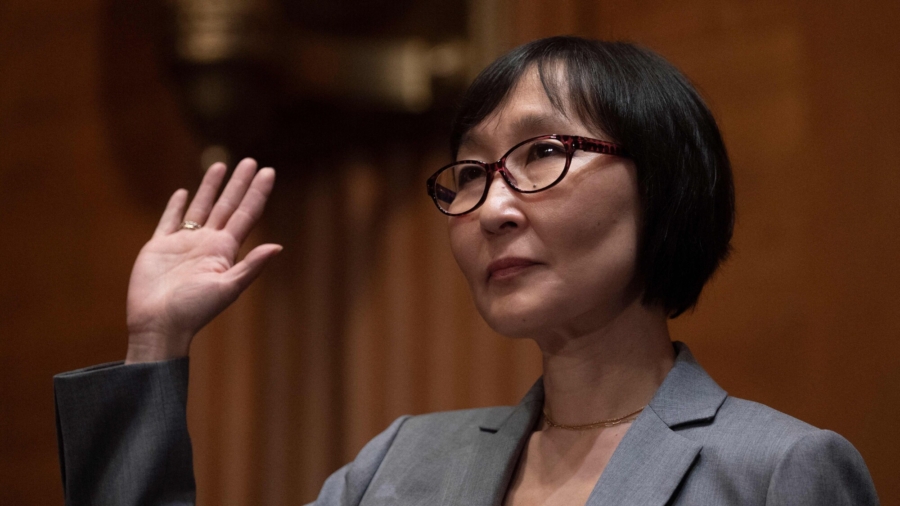Saule Omarova, nominated by President Joe Biden for the role of one of the top banking regulators, on Nov. 18 tried to portray her recently published proposal to centralize banking as merely an outline of one among many options to consider rather than her own preference.
Her proposal, outlined in an October paper titled “The People’s Ledger,” would have the government take all bank deposits and put them in the Federal Reserve, which would then be able to control who does and doesn’t get a loan (pdf). This would drastically expand government control over finance and exacerbate a number of problems, several experts previously told The Epoch Times.
During her Nov. 18 confirmation hearing for Treasury’s comptroller of the currency, Omarova said her paper was written in the context of “academic debate” around digitizing the dollar “because this seems to be an inevitable solution.”
“The paper seeks to address the implications of that step for the entire financial system,” she said, arguing that it was her job to “expand the boundaries of academic debate and outline potential options for Congress to consider.”
However, ranking member Pat Toomey (R-Penn.) pointed out that that isn’t how she framed her ideas in the paper.
“‘This Article … advocates full migration of demand deposits onto the Fed’s balance sheet,'” he quoted from the paper. “Are you now saying you’re no longer for that?” he asked.
“Senator, what I’m trying to clarify here is the problem this paper was trying to solve,” she replied, making a point that digitization of currency would hurt community banking and give an advantage to the Big Tech and institutional players on Wall Street.
Her paper does mention digitization proposals as well as the idea of allowing people to open Fed accounts without abolishing private banking, Toomey acknowledged. But he stressed that she portrayed the centralization idea as the preferable option in the paper.
“This is what you recommended, and it doesn’t seem to be a coincidence that every one of these thought experiments or academic ideas—every one of them—involved dramatic expansion in the power and control of the central government to allocate resources, to control banking, and a corresponding diminution in the freedom of individual Americans and institutions,” he said.
Omarova also addressed her previous statements, in which she said: “The way we basically get rid of those carbon financers is we starve them of their sources of capital,” and “We want them to go bankrupt if we want to tackle climate change.” During the hearing, she said “that was a poor phrasing” and that she was actually talking about “helping workers in this sector to transition to high-paying jobs if we’re looking into the future and the rise of new technologies.”
John Berlau, senior fellow at the free-market Competitive Enterprise Institute, was skeptical of that explanation.
“For someone who chooses her words very carefully, it’s hard to buy that she misspoke,” he told The Epoch Times, noting that Omarova has a record of advocating for such ideas.
Omarova said her previous jobs at a banking law firm and in the Treasury taught her “the invaluable lessons about how financial sausage is made and how that can lead to devastating financial crises.”
She said she would work “to guarantee a fair and competitive market where small and mid-sized banks that invest in neighbors’ homes and small businesses can thrive, and where every community, regardless of wealth geography or history, has access to safe and affordable financial services.”
She stressed that it was up to Congress to decide whether or not to implement her ideas.
Toomey addressed that argument in his opening statement.
“I suspect Prof. Omarova may claim that as comptroller, she wouldn’t have the power to act on all of her radical views. But the truth is the comptroller is a powerful regulator. It wields enormous powers through bank chartering, regulation, enforcement, and especially through its opaque supervision process. The comptroller is also a member of the FDIC [Federal Deposit Insurance Corporation] Board and the Financial Stability Oversight Council, America’s financial super-regulator,” he said.
He called her ideas “a socialist manifesto for American financial services.”
“These are exactly the kind of socialist ideas that have failed everywhere in the world they’ve been tried,” he said (pdf).
Chairman Sherrod Brown (D-Ohio) defended Omarova as “one of the most qualified nominees ever for this job.”
In his opening statement, he criticized some Republicans who questioned Omarova’s college thesis on Marxist economics during her studies at Moscow State University (pdf). He pointed out that, though born in the Soviet Union, she “renounced her communist citizenship and became an American.”
From The Epoch Times


